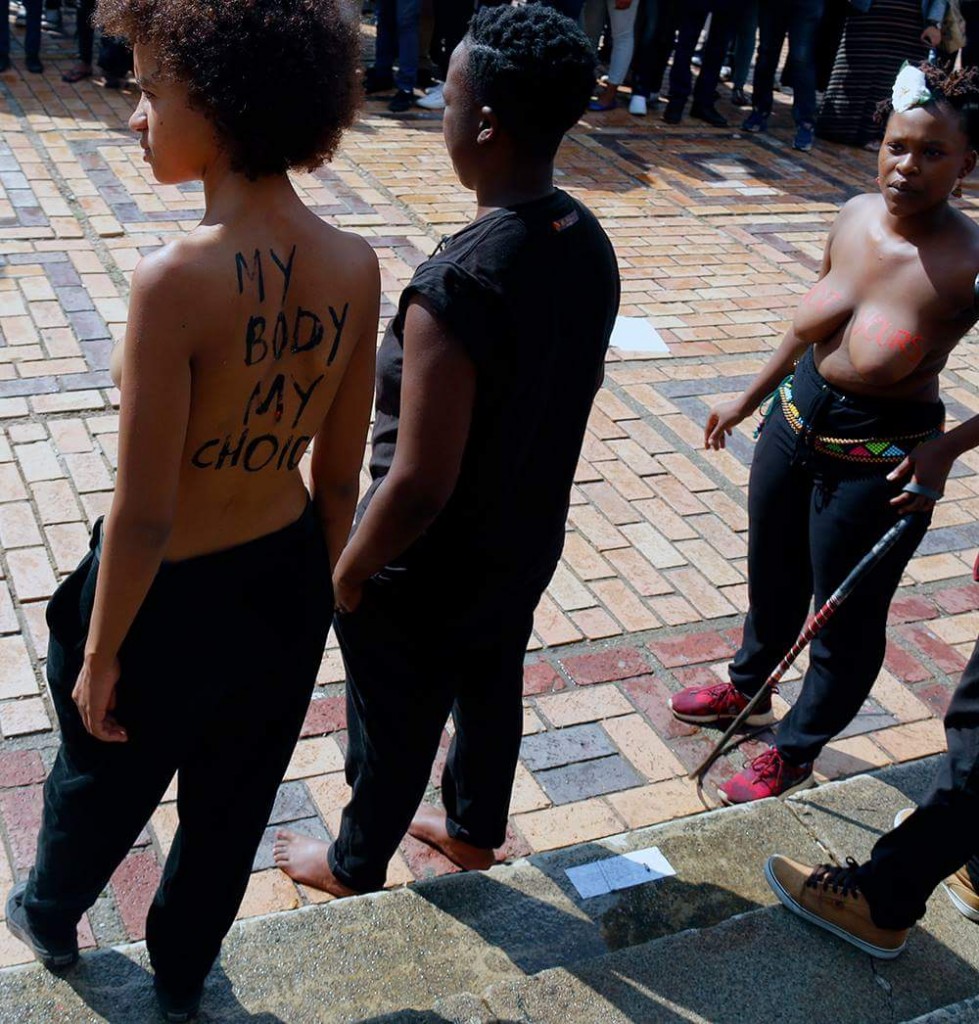Politics & Lifestyle
Why is it OK to be naked in porn but not protest?
Posted By Afro-Awesome Guest contributor
On Jun 16, 2016
By Kagure Mugo
As a society we love naked women. We use female bodies to sell everything, from standard kitchen tiles to Ferraris. Being naked can even win you an Oscar, or get you trending or Instagram famous. The very same society, however, is not so happy when a woman’s body is not used for public pleasure and consumption but for protest. This is what makes this particular form of revolt so powerful.
It’s no wonder then that the #RUreferenceList (and the #Iam1in3 solidarity protest) have society fuming. The protests came in the wake of the release of a list of perpetrators of sexual violence at Rhodes University on social media and society turned up their noses. Women using their own bodies as a weapon. The audacity of it all.
One woman on Facebook put it very well when she said the reason many men were angry at the naked protest is because it was “consented nakedness.” She went on to say men had no problem with women being naked, as evidenced by the mass watching of porn, cat calling in the streets and the stripping of women in public. They are fine with it as long as it forms part of the sexual male gaze. She then goes on to argue that if these exact photos had been leaked many would have them on their phones, sharing them and making them viral.

Photo cred : Kyle Oberholzer- Wits Vuvuzela
The nakedness of women is everywhere, all the time, with little to no negative reaction however when women use it as means of statement it becomes a problem. And this is probably one of the most powerful tools of protest in the hands of women. Time and time again women have used their naked bodies to show their dissatisfaction with the status quo. From protesting arrests in Tunisia, to highlighting and fighting assault in Turinawe, women have used their bodies to show that enough is enough. This is not a new phenomenon.
In 1929 Nigerian women went topless during the Women’s War to protest taxation and advocate for a return to pre-colonial cultural practices. In the Ivory Coast in 1949 (during the time of French colonial rule) around 2,000 women protested against the incumbent authorities seeking the release of political leaders and their imprisoned husbands. Once they reached the gates of the jail within the city of Grand Bassam they stripped naked, sang and danced smeared white kaolin clay. This action was seen by many to be a pivotal point in the anti-colonial struggle in the country.
Another powerful example was in 1992 when Nobel Peace Prize Laureate Waangari Maathai joined a group of elderly mothers who launched a hunger strike to pressure the government into releasing their sons who were political prisoners. The response of the police was to attack them with guns and tears gas. The women then proceeded to strip naked and rumour has it the police subsequently ran away. And she is not the only Nobel Prize winner to do so either, Leymah Gbowee also stripped to protest against stalled peace talks during the Liberian Civil war.
Recently, in Uganda, Dr Stella Nyanzi, a medical anthropologist and prominent researcher fellow at the Makerere Institute for Social Research, stripped down to her underwear in protest over the illegal eviction from her office by the head of the institute, Professor Mahmood Mamdani. She also voiced her dissatisfaction at the oppressive environment – that is hostile to the staff and PhD students – which for years she tried to address through the proper channels.
Predictably, rather than deal with the “rot within the institution,” Ethics and Integrity Minister Simon Lokodo ordered the arrest of Dr Nyanzi because “even if she was offended by anyone she behaved indecently.” Under Ugandan laws Dr Nyanzi would be charged under the Anti-Pornography Act.
This mirrors the response to the rape culture protests in South Africa. The actions by the #RUreferenceList protestors were also meant with the heavy hand of the law. It’s been reported that the leaders of the movement were ‘interdicted by the courts, beaten back by police and harassed by those named on a “rapist list” and their supporters.’ The protestors were also attacked with stun guns and some arrested.
Again, rather than deal with the structural injustices within an academic institution and the deeply entrenched rape culture in society, we would rather police women’s bodies.
Dr Nyanzi wrote in a particular fiery Facebook status about all the family members who had been outraged by her nudity and protest. One man then showed real analytical prowess when his response to her protest was “your undressing made my dick hard.” Thank you for that kind sir but hers, and other women’s actions, were not for the benefit of male arousal. We shall file your response under ‘helpful things that people say on the internet.’
Yet what is mesmerising about all this is how powerful the female body is. It is incredible to see how women are using their bodies to disrupt a world that feels uncomfortable with them breast feeding but gives them an Oscar when they appear topless in a film. It is times like these we pay more than lip service to the true power of the female body. As explained so eloquently by Acaye Elizabeth Pamela the reason the female body gets people worked up is because “It is beautiful and glorious, it’s a temple it’s a playground but it is also a weapon.”
This was first published on This Is Africa.
*leave a comment on the post, you can write it under a different name and your email will not be published.*
To submit to HOLAA! email submissions@holaafrica.org